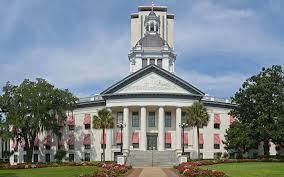Calls for DeSantis to veto some bills
News Service of Florida — With the 2024 legislative session ending last week, it’s now time for veto requests.
Among the veto pleas already made to Gov. Ron DeSantis: Don’t sign a bill (HB 49) that would loosen decades-old work restrictions for 16- and 17-year-old youths; protect businesses and farmers by vetoing a bill (SB 1698) that would outlaw euphoria-inducing hemp products; nix a bill (HB 931) that would allow volunteer chaplains at public schools; and short-circuit an energy bill (HB 1645) that includes banning offshore wind turbines.
Of the 313 bills approved by the Legislature, 295 had not been formally sent to the governor’s office as of Wednesday evening. The process usually is spread out over several weeks.
Senate spokeswoman Katie Betta said Senate President Kathleen Passidomo, R-Naples, “Has signed all of the bills and directed the secretary to transmit them at the request of the governor.”
Most bills will be signed without causing a stir. But a handful are more controversial after getting approval from the Republican-controlled Legislature. For example:
The Sierra Club, the Center for Biological Diversity and the South Florida Wildlands Association are among groups seeking a veto of a bill (HB 87) that would allow people to kill bears when they reasonably believe it is necessary to avoid a threat of death or serious injury. The bill stems from complaints about bears posing a threat to residents in rural areas of Northwest Florida.
“To begin with, this legislation is completely unnecessary,” the South Florida Wildlands Association said in urging members to ask DeSantis for a veto. “In Florida or any other state, killing any animal in a legitimate act of self-defense is already permissible under common law.”
Miami-Dade County Mayor Daniella Levine Cava, the Sierra Club, the National Council for Occupational Safety and Health and the Farmworker Association of Florida are among critics seeking a veto of a bill (HB 433) that would prevent local governments from putting requirements on contractors about wages and heat-exposure protections for workers.
“A report from 2018 found that outdoor workers between the months of May and September in every Florida county were exposed to heat levels above the recommended threshold identified by the National Institute of Occupational Safety,” the farmworker association said.
Groups such as NetChoice want DeSantis to veto a bill (HB 3) that seeks to prevent children under age 16 from opening social-media accounts — though it would allow parents to give consent for 14- and 15-year-olds to have accounts. NetChoice, a tech-industry group, and other opponents have argued the bill would violate First Amendment rights.
“HB 3 in effect will impose an ‘I.D. for the Internet’ on any Floridian who wants to use an online service — no matter their age,” NetChoice said.
On the positive side, not everyone is asking DeSantis to liberally employ his veto pen in considering the bills and a proposed $117.46 billion budget.
Florida Mosquito Control Association President Richard Weaver backed a proposed $1 million budget increase to $3.6 million for efforts to control the pesky insects that can carry West Nile, Zika, Dengue and other diseases.
“Controlling mosquitoes and the diseases they carry is critical in protecting Floridians and visitors as well as our economy,” Weaver wrote in support of the increase. “Success is never final when battling ‘the world’s most deadly animal,’ and our state is experiencing a rapidly increasing risk of diseases being spread by invasive species.”
Meanwhile, the Florida Health Care Association and LeadingAge Southeast — groups that represent nursing homes — praised a proposed 8 percent Medicaid funding increase for nursing homes.
“We are so thankful to the Florida Legislature for their strong investment in Florida’s nursing centers to help us meet the growing demand for qualified caregivers,” Florida Health Care Association Chief Executive Officer Emmett Reed said in a statement.
TWO-YEAR LOOK
In a post-session news conference, DeSantis leaned heavily on 2023 as he called the work of the Legislature over the past two years “The most productive, consequential, in the history of the state of Florida.”
But every year’s session is different. Bill Herrle, executive director of the small-business group NFIB Florida, is squarely in the camp of people who view 2023 better than 2024.
Herrle noted this year’s session was expected to be “a bit underwhelming” after “dozens of NFIB priorities” were enacted in 2023. As an example, lawmakers in 2023 approved changes that helped shield businesses from costly lawsuits.
But Herrle called the 2024 session “one of the more lackluster sessions for small businesses in recent memory.”
Business groups, including NFIB, sought an additional reduction in a commercial-lease tax that they have long sought to eliminate. But lawmakers jettisoned such a reduction and replaced it with a DeSantis priority to give bill credits to frequent toll-road users.
The Human Rights Campaign acknowledged “breathing a sigh of relief” with the end of the session as LGBTQ-related bills died.
“After years of unprecedented onslaught, dozens of proposed anti-LGBTQ+ bills were defeated,” Human Rights Campaign said in a news release.
SOCIAL MEDIA POST OF THE WEEK: “Social media is an awful place for adults too. But unlike the children HB3 will protect, adults like @DojaCat have the wherewithal to walk away and shut the app down before it’s too late.” — House Speaker Paul Renner (@Paul_Renner), who led efforts to pass a bill that seeks to keep children off social media.




